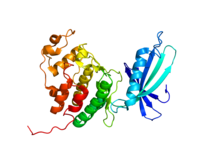
Photo from wikipedia
Cyclin-dependent kinases (CDKs) are involved in many crucial processes, such as cell cycle and transcription, as well as communication, metabolism, and apoptosis. The kinases are organized in a pathway to… Click to show full abstract
Cyclin-dependent kinases (CDKs) are involved in many crucial processes, such as cell cycle and transcription, as well as communication, metabolism, and apoptosis. The kinases are organized in a pathway to ensure that, during cell division, each cell accurately replicates its DNA, and ensure its segregation equally between the two daughter cells. Deregulation of any of the stages of the cell cycle or transcription leads to apoptosis but, if uncorrected, can result in a series of diseases, such as cancer, neurodegenerative diseases (Alzheimer’s or Parkinson’s disease), and stroke. This review presents the current state of knowledge about the characteristics of cyclin-dependent kinases as potential pharmacological targets.
Journal Title: International Journal of Molecular Sciences
Year Published: 2021
Link to full text (if available)
Share on Social Media: Sign Up to like & get
recommendations!